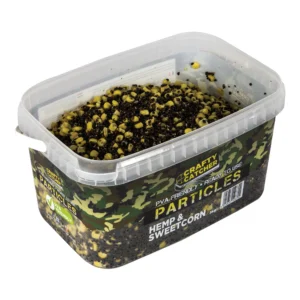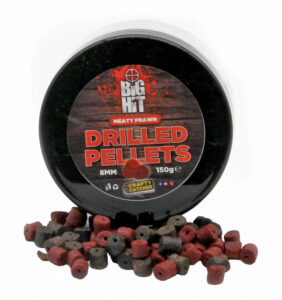Particles vs. Pellets: A Complete Guide to Choosing the Best Bait for Your Fishing Needs
Fishing enthusiasts often find themselves at a crossroads when deciding between using fishing particles or fishing pellets as bait. Both have unique attributes that can significantly impact your success on the water. This guide will explore the differences between particles and pellets, helping you choose the best option for your fishing needs.
Particles vs. Pellets: Which Bait is Best?
What Are Particles and Pellets?
Particles are natural baits like hempseed, sweetcorn, and other seed mixes. They mimic the natural food sources of fish, making them an attractive option for many anglers.
Pellets, on the other hand, are manufactured baits like micro, expander, and halibut pellets, known for their strong attraction and versatility.
When To Use Particles or Pellets
Both offer different things when it comes to fishing, so knowing when to use either particles or pellets will determine how your experience is.
 When to Use Particles
When to Use Particles
Particles offer a natural appearance and versatility, making them ideal for pre-baiting, fishing over silt, and targeting cautious carp. Their subtlety can be particularly effective in scenarios where fish are wary of more artificial options.
Want some particle bait tips? Read our particle bait-focused blog now!
When to Use Pellets
Pellets are prized for their strong attraction and variety in size and breakdown rates. They are perfect for feeder fishing, targeting larger fish, and during short sessions when you need quick results. There are many pellet bait techniques you could use to your advantage to elevate your fishing experience, like adding colour to your pellets.
Comparing Effectiveness: Particles vs. Pellets
When comparing particles and pellets, consider factors like scent, attraction, breakdown, and visibility. Particles often have a more subtle scent, while pellets can release strong aromas that draw fish in quickly. Here’s a quick comparison:
| Attribute | Particles | Pellets |
| Scent | Subtle | Strong |
| Attraction | Natural appearance | High attraction due to additives |
| Breakdown | Slow, depending on type | Varies, can be fast or slow |
| Visibility | Natural colours | Can be dyed for better visibility |
Tips for Preparing and Presenting Particles and Pellets
- Soaking: Soak particles to enhance their natural appeal and soften them for easier consumption.
- Flavouring: Add flavours to pellets to increase their attractiveness.
- Combining: Mix both baits to create a diverse feeding area that can attract a wider range of fish.
 Using Particles and Pellets Together
Using Particles and Pellets Together
Combining particles and pellets can enhance feeding areas and increase your chances of success. The natural look of particles paired with the strong scent of pellets can create an irresistible combination for fish.
Seasonal Considerations: Particles vs. Pellets
In summer, fish are more active, making pellets a great choice due to their strong attraction. In winter, particles can be more effective as they offer a more subtle approach, which is ideal when fish are less active.
FAQs About Particles and Pellets
- Do particles or pellets work better in silty waters? Particles are often preferred in silty waters due to their natural appearance and subtlety.
- How do water temperature and depth affect bait choice? Warmer temperatures and shallower depths favour pellets for their quick attraction, while cooler temperatures and deeper waters suit particles.
- Can you overfeed with particles or pellets? Yes, overfeeding can lead to fish losing interest, so moderation is key.
- What hookbaits to use with them? The modern approach with both is to use them with Boilie, Pop up or Wafter hookbaits. But equally Particles like Tiger nuts and Maize make great on Hair rigs whilst larger pellets can be banded to a hook or drilled for a hair rig.
Key Takeaways
Choosing between particles and pellets depends on your specific fishing scenario. Both have their strengths, and trying both based on the outlined scenarios can enhance your fishing experience. Whether you’re pre-baiting with particles or using pellets for quick attraction, understanding each bait’s unique attributes will help you make informed decisions on the water.
